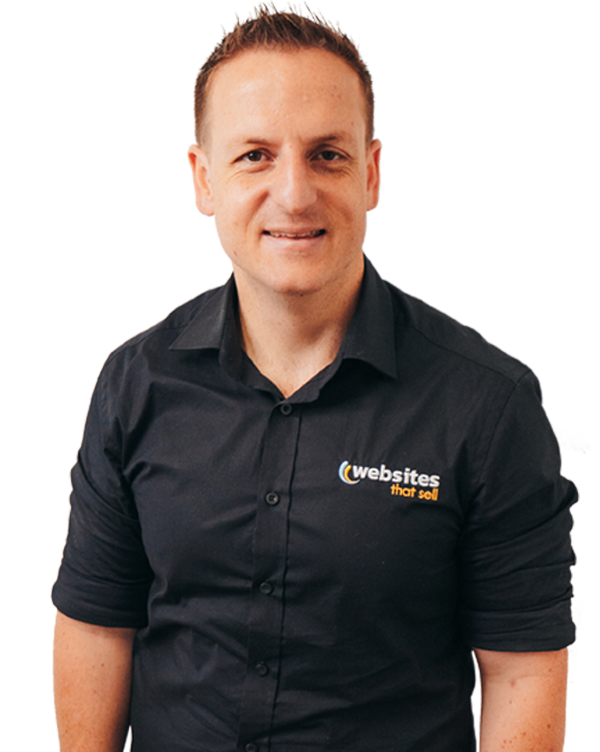We spent 12 months tracking 36 Australian businesses.
Construction companies, dental practices, plumbers, waste management, real estate agencies, and more.
We tracked everything: organic traffic, rankings, backlinks, Google Business Profile stats, reviews, page speed, content output.
Here’s what we found:
Three things matter more than everything else:
- Backlinks: 81.6% correlation with traffic
- Consistent content: 326% performance boost
- Review volume: 8x difference between top and bottom performers
Page speed? Weak correlation.
Perfect 5-star ratings? Not necessary.
Fully AI automated content? Actively hurting the one business using it.
Let's get into what we actually found.
Australian Local SEO Statistics That Actually Matter in 2025 (original research)
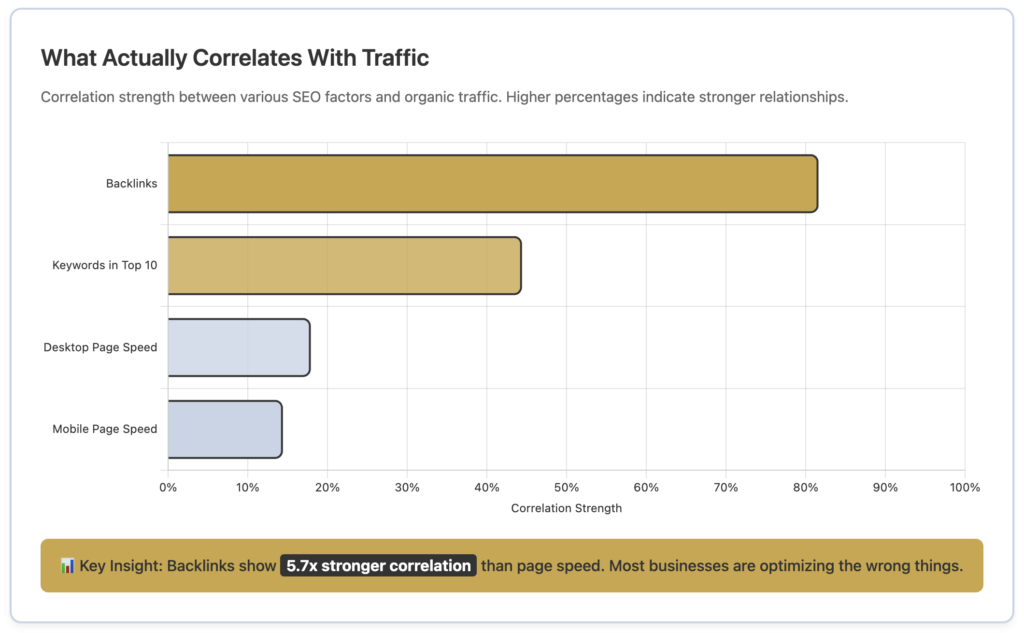
1) Local businesses targeting multiple locations drive 557% more traffic on average than single-location businesses.
Multi Location Matters in Local SEO!
Multi-location average: 80,022 sessions
Single-location average: 12,186 sessions
This isn't just about having more physical locations.
It's about content scale, geographic reach, and authority signals across multiple service areas.
If you're a single-location business, you can't compete on breadth.
You need depth, comprehensive service pages, local content that actually helps people, and aggressive link building.
2) Backlinks show an 81.6% correlation with organic traffic in local SEO
Backlinks: 81.6% Organic Traffic Correlation (The Big Thing That Matters)
This blew away everything else in our dataset. Backlinks aren't just "one ranking factor among many."
They're THE factor.
Top 25% performers: 547 average referring domains
Bottom 25% performers: 15 average referring domains
Gap: 35x more backlinks
If you're not building backlinks, you're losing.
3) Businesses ranking for more keywords in their local area show a 44.4% correlation with traffic.
Keywords in Top 10: 44.4% Correlation
Top performers: 448 keywords in top 10
Low performers: 94 keywords in top 10
Gap: 5x more rankings
More rankings create a compounding effect. More visibility, more clicks, more brand searches, stronger authority signals.
4) Multi Location Businesses In Local Markets (suburb pages or multiple city pages) beat single location websites with 557% higher traffic averages.
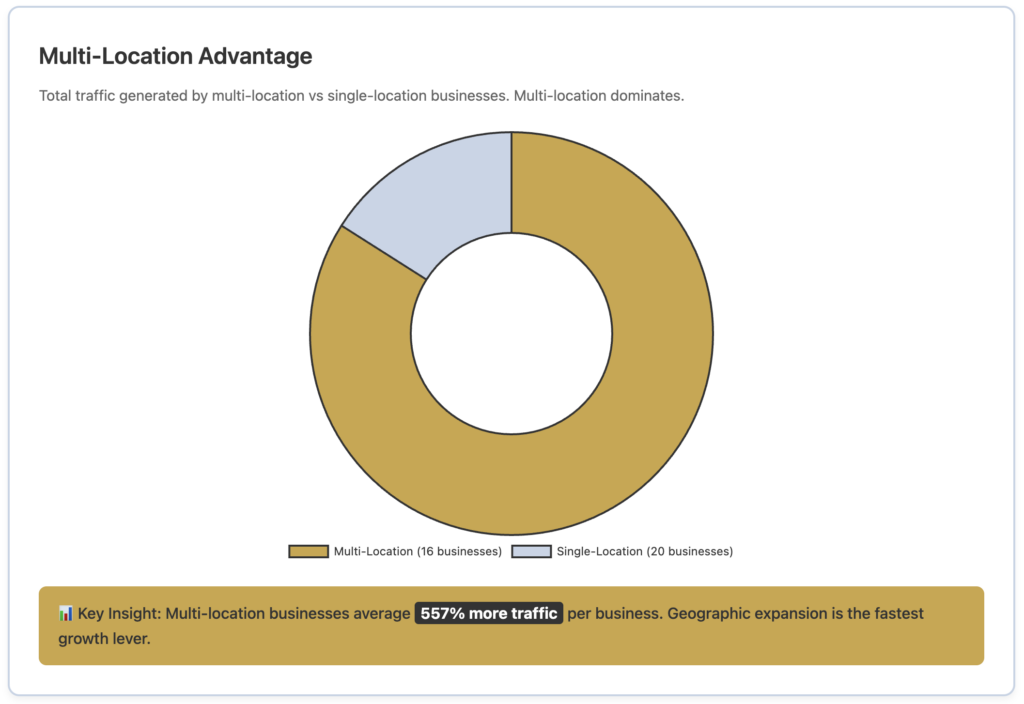
Letting Google know which areas you cover matters.
This study found that multi location businesses average 557% more traffic per business.
This means that geographic expansion is the fastest growth lever.
If you haven't expanded into nearby suburbs, regions or cities - this is proven expansion strategy in local SEO.
5) Desktop page speed shows just 17.9% correlation with local traffic. Mobile page speed: 14.4%
Page Speed: 14-18% Correlation (Barely Matters)
We had businesses with a Google Page Insights Score of 43 performing well.
We had another businesses with a Google Page Insights Score of 98 performing poorly.
The correlation was weak.
Don't obsess over getting a perfect 100 score on Google page speed testing tools.
Get above 50, then move on.
Spend your time building backlinks and creating content.
6) Businesses publishing 2+ pages per month consistently averaged 326% more traffic than those without a content strategy.
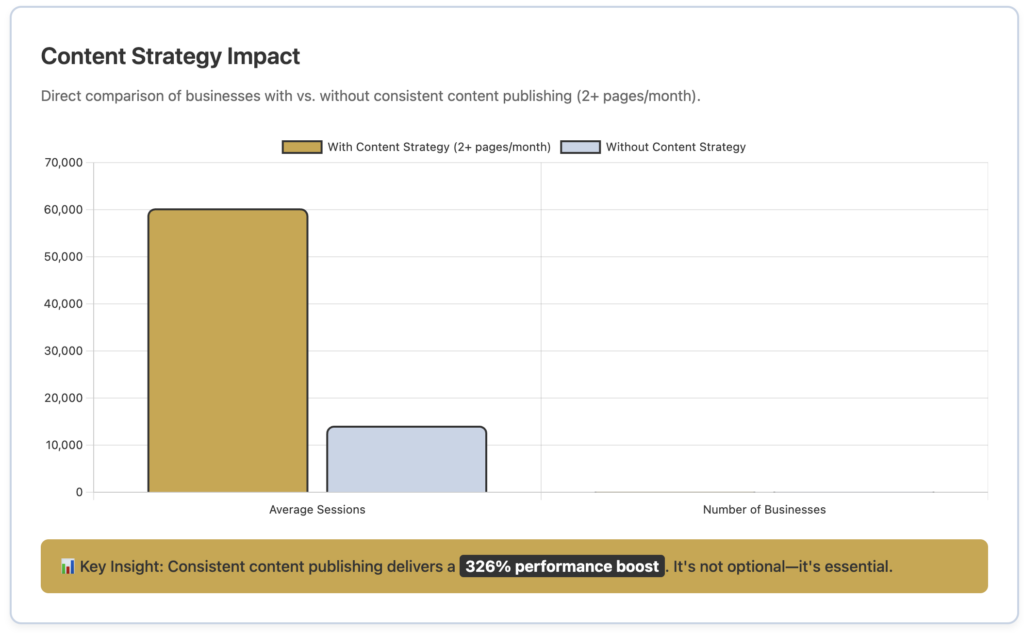
Content Publishing: 326% Performance Boost
With consistent content strategy (22 businesses): 60,276 average sessions
Without content strategy (14 businesses): 14,143 average sessions
The highest-traffic businesses all published aggressively:
- Diagnostic Imaging Company (547,379 sessions): Regular health guides, location-specific content
- Preventative Dermatology (385,731 sessions): Consistent blog posts about skin cancer
- Hot Water Services (269,317 sessions): Emergency plumbing guides for every location they serve
Content isn't just keyword targeting.
It's establishing topical authority and creating more entry points for people to find you.
7) Using fully AI automated content averaged 854% lower traffic than local businesses creating original content.
The Raw AI Output Problem
Using Fully Automated AI content (1 business): 4,549 sessions
Not using AI (35 businesses): 43,415 average sessions
Yes, it's just one business.
Small sample size.
But it matches what we're seeing elsewhere.
Google is getting better at detecting and devaluing thin AI content.
If you're using AI, fine - good!
We use AI in-house - it helps us do more at a higher level of quality.
But you need heavy human editing, fact-checking, and unique insights.
Raw ChatGPT output isn't working in 2025.
8) The average local business generated 1,873 phone calls, 5,151 interactions, and 2,182 website clicks annually from their Google Business Profile.
Google Business Profile: The Hidden Customer Source
27 businesses gave us their GBP data.
For most businesses, that translates to 150-300 customers per year directly from their Google listing.
Your GBP isn't optional… It's often the first impression and a major revenue driver.
9) Top-performing businesses averaged 8x more reviews than low performers—but perfect ratings weren't required.
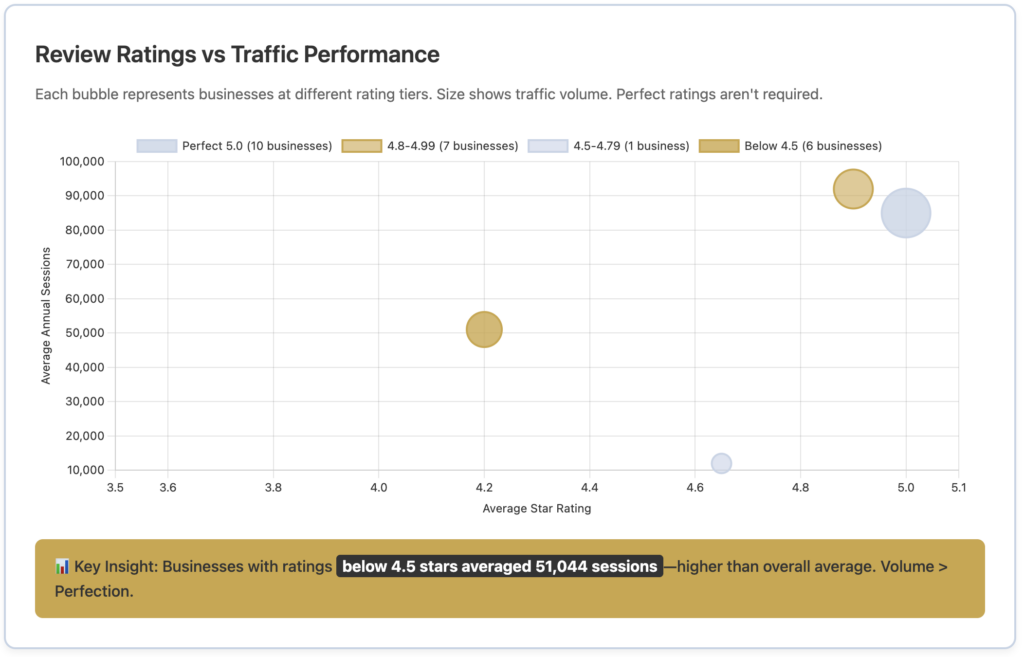
Reviews: Volume Over Perfection
Top performers: 166 average reviews
Low performers: 21 average reviews
Gap: 8x more reviews
Here's the interesting part: perfect ratings aren't required.
We broke businesses into rating tiers:
- Perfect 5.0 stars: 10 businesses
- 4.8-4.99 stars: 7 businesses
- 4.5-4.79 stars: 1 business
- Below 4.5 stars: 6 businesses
The below - 4.5 group averaged 51,044 sessions.
This is higher than the overall average.
One multi-location business had a 3.58 rating and 259,492 sessions.
Review volume and recency matter more than a perfect rating.
A business with 100 reviews at 4.3 stars will usually beat one with 10 reviews at 5.0 stars.
10) 98% of consumers used the Internet to find information about local businesses in 2022, up from 90% in 2019.
Your Google Business Profile Is Essential For Local SEO
Every Australian business needs to set up a Google Business Profile (formerly Google My Business "GMB")
According to research, Local businesses receive 94% of calls from GMB on weekdays.
A regular enterprise gets discovered in 1,009 searches monthly
- 56% of actions on Google My Business listings are website visits
- 72% of local businesses have claimed their Google My Business profile
- 93% of consumers search Google Maps to find a business
- 72% of Google users will prefer a business that is closer to their location on Google Maps
- 59% of customers view Google My Business images before making a purchase
- 51% of GMB profiles receive more than 1000 views per month
- 60% interactions on GMB profiles are a website click
Businesses that claim and verify their Google Business Profile are more likely to be considered reputable by customers.
Having a complete GBP profile - using the right category, attributes for your business along with regular photos and business updates is essential for your local SEO.
11) 70% users used the click to call feature to connect with the business directly from the search results page.
Don’t Underestimate The Importance Of Click-To-Call
Google commissioned Ipsos, an independent market research company, to understand consumer attitudes about click to call within organic and paid mobile search results.
The study explored behaviours within the context of 7 different Google verticals: Travel, Restaurant, Finance, Retail, Technology, Local Services and Auto.
According to the survey, 70% users used the click to call feature to connect with the business directly from the search results page.
It helps customers find out the store hours, make an appointment or reservation or inquire about inventory/ booking information.
The prime motivator for using click to call feature is to get an answer stat and to talk to a real person.
What does that mean for you?
You could increase clickthrough rate by simply adding a call button and connect with your customers effortlessly.
12) 18% of local smartphone searches led to a purchase within a day, whereas only 7% of non-local searches led to a sale.
Mobile Optimisation Is Essential
We rely majorly on our smartphone devices to find information or buy anything.
Mobile-first indexing is a default for all new websites. Google has come a long way from their first
"Mobile Update in 2015".
Optimising your website for mobile devices is essential to boost your rankings.
Case in point - 18% of local smartphone searches led to a purchase within a day, whereas only 7% of non-local searches led to a sale.
Searchers have an intent to buy when they are searching via their smartphones.
Capitalising on their intent can help you improve your sales.
With 73% of retail transactions happening using a mobile device, it is important for businesses to offer seamless opportunities to shop online and have an engaging, user-friendly mobile experience.
People are more likely to conduct a local search and then visit your store
- 76% of people who conduct a local search on their smartphone visit a physical place within 24 hours, and 28% of those searches result in a purchase.
- 72% of users who did a Google search visited a store within 8km of where they were searching.
Research shows that consumers use search engines to find brands and businesses. These searches have a purchase intent, and after looking up your business, they are more likely to visit your store.
Take advantage of a Google Business Profile, local directory listings and social media to make sure your business stands out in the crowd.
Improve your website and include exact address, store hours and phone number to make sure your customers can find you. Use Google My Business, local directories (Yelp, Yellow Pages, etc) and social media to capitalise on this feature.
13) 61% of shoppers would rather shop with brands that also have a physical location than ones that are online only.
Brick And Mortar Stores Aren’t Dead
Nearly 80% of shoppers will go to the store to buy when they have an item they need or want immediately.
Having a physical location can be an important factor in consumer behaviour.
80% of shoppers prefer to go to a physical store to purchase an item when they have an immediate need or want for it.
This suggests that even though online shopping is becoming increasingly popular, many shoppers still value the convenience and immediacy of being able to physically go to a store to purchase items.
And if your business is easily discovered on search engines, you have a great way to increase the footfall to your business.
On an average, it takes at least 8 touch points before you can close a sale.
Customer touch points are the interactions a customer has with a product, service or company during their journey.
They represent the ways in which a customer can experience a brand and form impressions, ranging from initial awareness to post-purchase follow-up.
It can be through:
- advertisements
- website
- customer-service
- SEO
- email marketing
- in-store experiences
- social media
and many more ways...
Each touch point provides an opportunity for the brand to engage with the customer and shape the perception of the brand.
By identifying and optimising customer experience, companies can improve customer satisfaction, loyalty, and retention, and ultimately drive revenue growth.
14) 90% people read reviews before purchasing and 72% people say that positive reviews make them trust a local business.
Use Reviews To Your Advantage
Online reviews are crucial to your success.
Bright Local conducted a study on the importance of local reviews and here are some of the key takeaways from the study.
- Google is the most trusted platform for reviews
- Email is the best way to get a review. However, it is super competitive and your email needs to stand out in the inbox.
- Consumers are more likely to pick a business that responds to positive and negative reviews. Craft genuine responses and you might even turn a negative experience to a positive experience.
- Email is the most effective way to get a review. But there’s no harm in asking for feedback when the customer is in-store. Encourage your staff to ask for reviews - if you don’t ask you won’t get!
- Amazon comes up at the top when it comes to fake reviews
15) About 33% of Australians use voice search on a daily basis, primarily for local queries.
Utilise The Power Of Voice Search
Voice search is gaining more popularity than ever.
Especially with improved natural language processing (NLP) and AI, showing up in voice search can be a game changer for your business.
- 1 billion voice searches are conducted each month
- Around 49% of Australians use their smart device to interact with brands, products, or services.
- 55% people use voice search to find local businesses
- 22% voice search queries look for location-based content
Voice search matters because at least a portion of your user base might be using voice search to discover businesses like yours.
Optimising your content to be discovered in voice search is essential to drive people to your business.
Using FAQ pages, optimising content and using correct business information is the best way to appear in voice search.
The Bottom Line
Top performers have 35x more backlinks, 5x more keyword rankings, and 8x more reviews than bottom performers.
Three things separate winners from losers in local SEO:
- Backlinks (81.6% correlation with traffic)
- Consistent content (326% performance boost)
- Review volume (8x advantage)
What matters less than you think:
- Perfect page speed scores (14-18% correlation)
- Perfect 5.0 ratings (businesses with <4.5 averaged 51K sessions)
- AI-generated content (854% lower performance)
- Header CTAs (focus on traffic first)
Which side of that gap will you be on in 12 months?
Methodology: We analysed 36 Australian businesses over a 12 month period (data source). Industries included construction, healthcare, dental, waste management, landscaping, real estate, home services, and B2B. We tracked organic traffic, rankings, backlinks, Google Business Profile metrics, reviews, page speed, and content strategies. Sample size limitations mean some findings (particularly AI content) should be interpreted carefully.
About Websites That Sell: We're a digital marketing agency that specialises in data-driven local SEO for Australian businesses. Want to apply these insights to your business? Contact us for a free local SEO audit.

